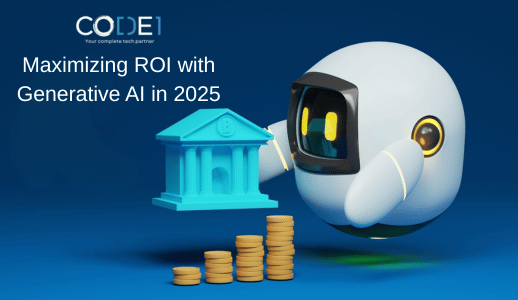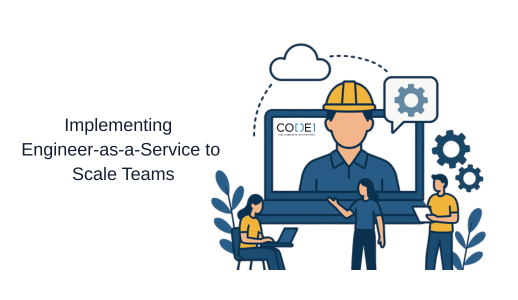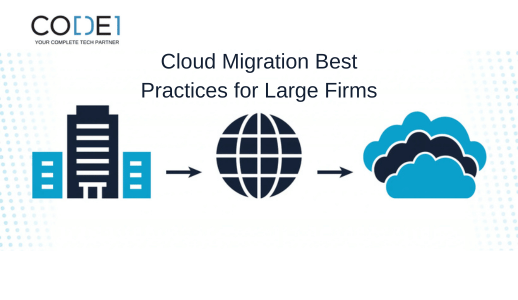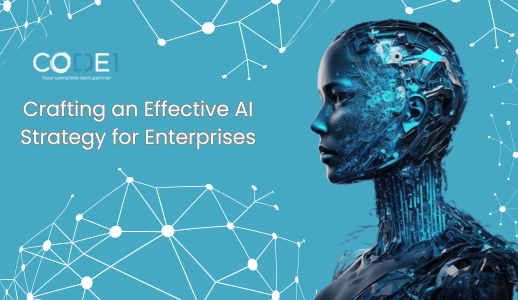
Published on: May 09, 2025
Maximizing ROI with Generative AI in 2025
Generative AI is no longer a term etched in the futuristic promise, it is becoming a part of daily operations. As the technology matures, organizations are moving from trial pilot experiments to enterprise-wide rollouts. According to McKinsey, 79% of business leaders have already integrated generative AI into at least one business function, and over 40% plan to increase their investment in 2025. However, in growing investment, leadership teams are right to ask: How do we ensure a meaningful return on our AI initiatives?
By the end, you will be ready to move from curiosity to pulling it off with a good generative AI ROI.
Understanding Generative AI
Generative AI refers to a specific area of artificial intelligence that produces content, images, voices, and even code. These are the machine learning models which are trained using diverse databases. Credited for its hype are consumer tools such as ChatGPT and Midjourney, but for the enterprise, the focus naturally shifts toward integration and scalability.
It's beyond automation. Such a capability can allow systems to closely replicate human creativity (at times) by introducing capabilities such as natural language generation, transformer-based architectures, and so on. But, of course, you have to keep a level of sobriety- having the best grasp possible on what technology can do, but even more so, on what it cannot do before you start dumping dollars down the hole into it.
Building Internal AI Literacy
For AI to generate financial extravagance, it must be an empowered development tool. Or, in layman's terms: all levels of training should be provided on AI literacy-from upper management to entry-level employees. For many leaders, AI is merely a data science project. However, when we say generative AI tools, an average user of these tools is a non-technical individual technically applying AI in their daily work.
Finding High-Value Use Cases
Most companies mess this one up. They go completely dependent from composing a hundred tweets to forecasting the next quarter revenue. The point is to search for high-value generative AI use cases in enterprise that can gain from generative AI ROI in terms of cost-cutting, enhancement of quality in output, time saved in savings, among others. Customer support scripts, marketing automation or report writing, or product descriptions: these are good examples. Another enterprise used generative AI to summarize legal documents and save 60 per cent of review time. This is the real deal. Long, tedious, and text-based processes are what mainly matter. Those are the gold mines that give efficiency through AI.
Generative AI for HR and Recruitment
Another venue where high-value generative AI use cases in enterprise are increasingly thriving is human resources. Recruiters employ AI to create job descriptions, sift through resumes, or even put together individual rejection or offer letters. Generative AI can also analyze employee feedback or engagement surveys to extract sentiment and generate actionable insights. For internal HR operations, generative AI can update policies or training documentation or even create onboarding manuals, thereby massively reducing turnaround times for HR projects.
Leveraging Domain-Specific Models for Maximum Impact
The more generative AI advances, the bigger the opportunity to efficiently increase generative AI ROI by investing in domain-specific models rather than generic ones. Custom models are trained with company or industry data, yielding much more accurate and relevant outputs.
For example, when operating in the financial service, a company can train its language model internally with great fidelity to brand operating standards and legal requirements from internal reports, compliance documents, and market research, so little to no post-editing is needed, which also greatly increases output quality. In manufacturing, technical documentation, service manuals, and safety protocols can be used to train models in generating maintenance checklists or repair instructions.
Addressing Legal and Ethical Considerations
The tightening of AI regulations worldwide requires enterprises to guarantee transparency, data protection, and explainability.
Some best practices include:
- Audit your datasets for bias and data provenance.
- Ensure model outputs are traceable and explainable.
- Incorporate routine legal review in AI workflows.
Train employees on the responsible use of AI tools
How does Code1 help you?
Code1 focuses in helping enterprises move beyond experimentation to successfully implement generative AI at scale. Our approach adds deep domain and technical expertise with proven frameworks and end-to-end execution capabilities. Whether you are exploring the use of new tools or looking for lower-level pilots, our team adds the strategic insight and technical precision that are necessary for valued outcomes.
We are committed to enterprise-grade delivery, simply because integrating AI into large environments and/or regulated environments is complex, be it compliance, security, change management, or even user adoption. Our clients can now reduce their time-to-value with customized AI strategy offerings aligned closely with business objectives.
From ideation to design, implementation, and support, we will be with you every step of the way to ensure shared success.
Ready to scale generative AI with confident assurance? Let's create solutions that matter. Reach out to us today.
Conclusion
Businesses must focus on purposeful implementation to achieve a meaningful generative AI ROI. It is not about flaunting artificial intelligence; it is about identifying actual high-value problems that AI can help solve situationally in reducing operational costs, a little faster in content creation, improving employee productivity, and satisfying customers.
Entering 2025, the organizations that are going to be running most successfully might not be the ones who were the first to take AI, but who went about it very strategically, measured their use, and are now governing it responsibly. With a good AI implementation strategy, generative AI becomes more than just another tool for an organization; it is an contributing factor to business growth and sustainability.
Published On: May 09, 2025
Latest posts

Implementing Engineer-as-a-Service to Scale Teams
In a very competitive digital economy, both enterprises and startups face intense pressure

Cloud Migration Best Practices for Large Firms
The global cloud computing market has achieved the $947 billion mark in 2025, propelling l

Crafting an Effective AI Strategy for Enterprises
Artificial Intelligence (AI) metamorphosed from a far-fetched futuristic idea into a curre

Maximizing ROI with Generative AI in 2025
Generative AI is no longer a term etched in the futuristic promise, it is becoming a part


